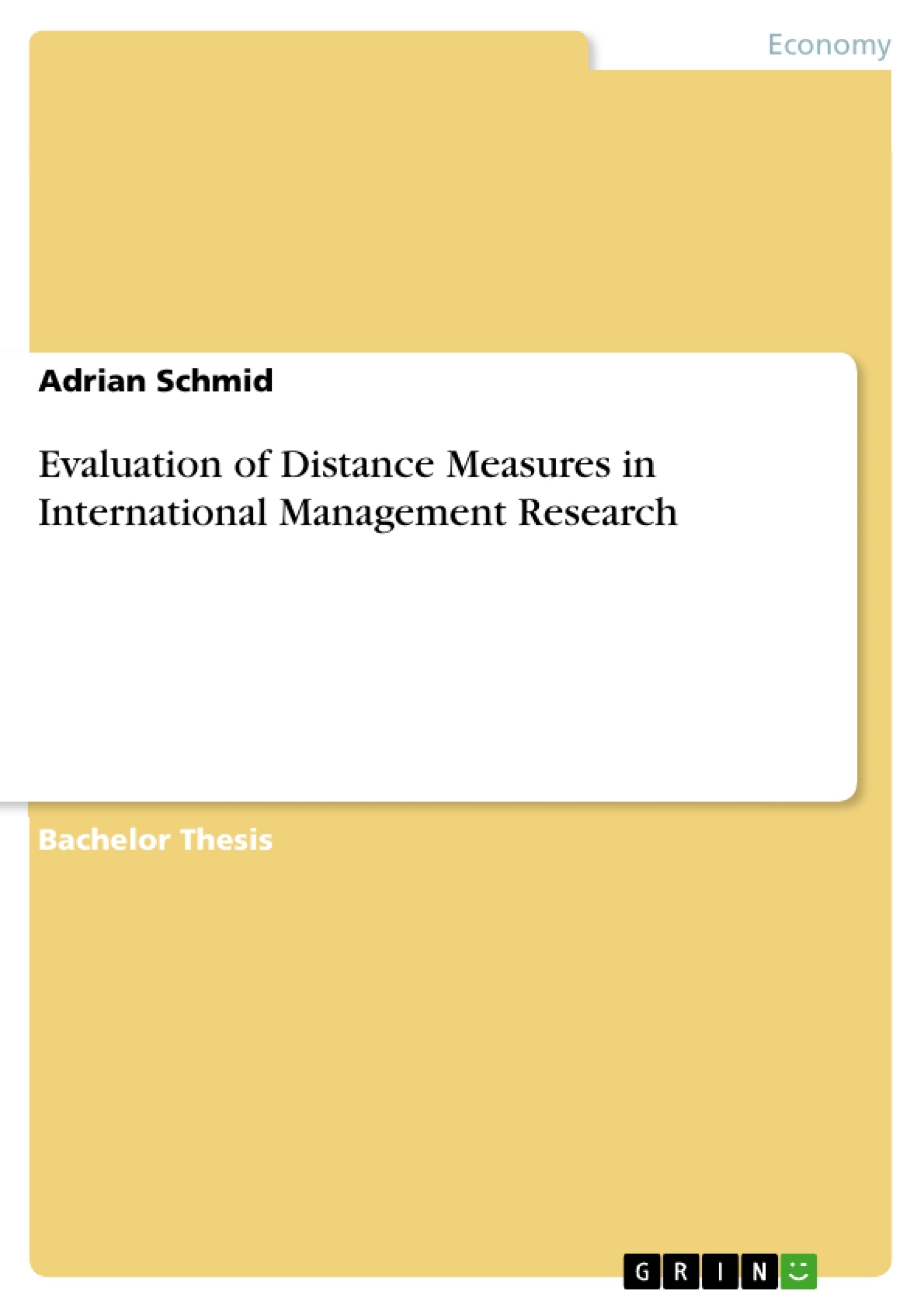
Evaluation of Distance Measures in International Management Research
Bachelorarbeit, 2013
39 Seiten, Note: 2.0
Leseprobe
Inhaltsverzeichnis (Table of Contents)
- 0. Abstract
- 1. Introduction
- 2. Most Common Concepts
- 2.1 Cultural Distance
- 2.1.1 Cultural Indices and Hofstede's Cultural Dimensions
- 2.1.2 Shalom Schwartz's Framework of Cultural Dimensions
- 2.1.3 Ghemawat's Managerial-Based Framework
- 2.1.4 Cultural Clusters
- 2.2 Institutional Distance
- 2.3 Psychic Distance
- 2.4 Linguistic Distance
- 2.1 Cultural Distance
- 3. Critical Review of Common Distance Concepts
- 3.1 Critical Review of Cultural Distance
- 3.2 Critical Review of Institutional Distance
- 3.3 Critical Review of Psychic Distance
- 3.4 Critical Review of Linguistic Distance
- 4. Discussion and Limitations
- 5. Executive Summary
Zielsetzung und Themenschwerpunkte (Objectives and Key Themes)
This paper aims to provide a comprehensive overview of how distance is measured in management research, and to highlight the criticisms leveled against these measures. It examines the various frameworks used to define and quantify distance constructs, analyzing their strengths and weaknesses. The paper also explores the widespread disagreement among researchers regarding the efficacy of these measures.
- Distance concepts in international management research
- Critical analysis of distance measures
- The limitations of existing distance frameworks
- Potential improvements and future research directions
- The impact of distance on international business strategies
Zusammenfassung der Kapitel (Chapter Summaries)
Chapter 1 introduces the significance of distance in international management research, emphasizing its relevance in navigating the complexities of globalization and the challenges companies face in operating across diverse cultures and institutions. It outlines the purpose and scope of the paper, highlighting the focus on cultural, institutional, psychic, and linguistic distance. Chapter 2 delves into the most commonly used distance concepts, offering a detailed exploration of each construct, including its theoretical underpinnings and practical applications. The chapter examines various frameworks for measuring cultural distance, including Hofstede's Cultural Dimensions, Schwartz's Framework of Cultural Dimensions, Ghemawat's Managerial-Based Framework, and the concept of cultural clusters. The chapter also discusses the concept of institutional distance, exploring the regulatory, cognitive, and normative institutions that influence business operations. Finally, it introduces the concepts of psychic and linguistic distance, outlining their relevance in international management research.
Schlüsselwörter (Keywords)
The key terms and concepts explored in this paper include cultural distance, institutional distance, psychic distance, linguistic distance, international management, globalization, foreign direct investment, business strategies, cultural dimensions, cultural clusters, and the liability of foreignness. This paper examines the use of these constructs in research and practice, highlighting their significance in understanding and navigating the complexities of operating in international business environments.
Details
- Titel
- Evaluation of Distance Measures in International Management Research
- Hochschule
- Eberhard-Karls-Universität Tübingen (Department of International Business)
- Note
- 2.0
- Autor
- Adrian Schmid (Autor:in)
- Erscheinungsjahr
- 2013
- Seiten
- 39
- Katalognummer
- V494285
- ISBN (eBook)
- 9783668999534
- ISBN (Buch)
- 9783668999541
- Sprache
- Englisch
- Schlagworte
- Management International Culture Hofstede ronen shenkar distance measures cultural distance business administration cultural dimensions international management distance psycological distance management theory qualitative approach cultural change international business miller kumar spencer gomez value systems diversity cultural diversity nations Hwang global strategy strategy National Culture Organisational Legitimacy organization organisational theory internationalization target market institutional chage change management transformation Cultural Adaptation business relationships Cultural Values Barriers cultural barriers gender diversity gender leadership theory bradley Institutionalism Psychic Distance Paradox Economic Performance Journal of International Business Studies cross-cultural puzzle entry strategy internationalization process of the firm International Operations Dimensionalizing Cultures managerial attitudes comparative study LINGUISTIC DIVERSITY culture patterns Multinational Corporation
- Produktsicherheit
- GRIN Publishing GmbH
- Preis (Ebook)
- US$ 17,99
- Preis (Book)
- US$ 19,99
- Arbeit zitieren
- Adrian Schmid (Autor:in), 2013, Evaluation of Distance Measures in International Management Research, München, Page::Imprint:: GRINVerlagOHG, https://www.diplomarbeiten24.de/document/494285
- Autor werden
- Ihre Optionen
- Vertriebskanäle
- Premium Services
- Autorenprofil
- Textarten und Formate
- Services für Verlage, Hochschulen, Unternehmen

- © GRIN Publishing GmbH.
- Alle Inhalte urheberrechtlich geschützt. Kopieren und verbreiten untersagt.
- info@grin.com
- AGB
- Open Publishing
Der GRIN Verlag hat sich seit 1998 auf die Veröffentlichung akademischer eBooks und Bücher spezialisiert. Der GRIN Verlag steht damit als erstes Unternehmen für User Generated Quality Content. Die Verlagsseiten GRIN.com, Hausarbeiten.de und Diplomarbeiten24 bieten für Hochschullehrer, Absolventen und Studenten die ideale Plattform, wissenschaftliche Texte wie Hausarbeiten, Referate, Bachelorarbeiten, Masterarbeiten, Diplomarbeiten, Dissertationen und wissenschaftliche Aufsätze einem breiten Publikum zu präsentieren.
Kostenfreie Veröffentlichung: Hausarbeit, Bachelorarbeit, Diplomarbeit, Dissertation, Masterarbeit, Interpretation oder Referat jetzt veröffentlichen!
- GRIN Verlag GmbH
-
- Nymphenburger Str. 86
- 80636
- Munich, Deutschland
- +49 89-550559-0
- +49 89-550559-10
- info@grin.com
-









